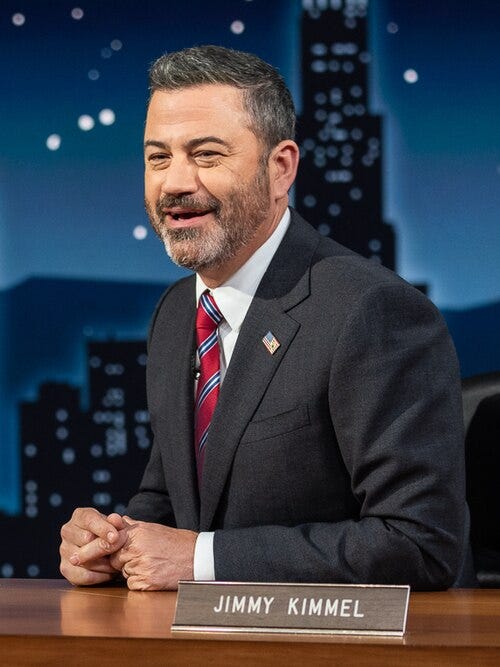
Jimmy Kimmel just got suspended for having an opinion.
Specifically, ABC pulled Jimmy Kimmel Live! off the air following backlash from the head of the Federal Communications Commission over remarks Kimmel made last week about the murder of Charlie Kirk. We have been vocal in our opposition to this, and as a result, we’ve received some criticism online. So let’s take a minute to consider some of the most common remarks and address those concerns.
We said an extraordinary amount of things. Let’s start with filing amicus briefs in two Supreme Court cases about government pressure on private companies last term, NRA v. Vullo and Murthy v. Missouri.
Vullo was about the superintendent of New York’s Department of Financial Services pressuring insurance companies and banks to stop providing services to the National Rifle Association. The Department didn’t quite order the companies not to work with the NRA. Instead, it met with the groups, pointed out regulatory violations that didn’t have anything to do with the NRA, and suggested the state might be less interested in pursuing those regulations if the companies “ceased providing insurance to gun groups, especially the NRA.”
As our brief explains:
The First Amendment does not permit the government to censor speech via informal or indirect means. When government officials “invok[e] legal sanctions and other means of coercion, persuasion, and intimidation” to chill disfavored speech, they impose “a scheme of state censorship” just as unlawful as direct regulation.
The Supreme Court unanimously agreed.
In Murthy, the states of Missouri and Louisiana and a handful of individual social media users sued various federal agencies and officials, arguing that content moderation private companies conducted during COVID-19 and the 2020 election was driven by “jawboning” — that is informal, coercive government pressure — from the Biden administration. Our brief argued that such informal pressure violates the First Amendment.
We wrote:
Although much attention has focused on the power of “Big Tech,” it is a bad idea for government officials to huddle in back rooms with corporate honchos to decide which social media posts are “truthful" or “good” while insisting, Wizard of Oz-style, “pay no attention to that man behind the curtain.” No matter how concerning it may be when private decisionmakers employ opaque or unwise moderation policies, allowing government actors to surreptitiously exercise control is far worse.
There’s simply no daylight between our positions in these cases and our position in the current FCC controversy.
In terms of advocacy, we stood up for a professor accused of bias after writing that if you question the lab origin of COVID-19, you should “at least consider that you are an idiot who is swallowing a whole lot of Chinese cock swaddle.” We argued against a University of Iowa policy limiting what faculty could say about masks and the virus. We criticized NYU for telling medical faculty not to talk to the press. We stood up for RAs whose university told them they couldn’t talk about it in Virginia, and RAs told they couldn’t criticize their University’s response in Maryland.
In research, last year we wrote the Fire Report on Social Media 2024, where we expanded on the problem of jawboning, and specifically how it occurred during the Biden administration. We noted, based on a survey from FIRE and IPSOS, that:
The American public is concerned about this issue. Our polling found that 77% of Americans believe it is important for social media companies to “[be] fully transparent about any government involvement in content moderation decisions,” including 79% of Democrats, 75% of Republicans, and 81% of independents.
So, yes. We have been loud, clear, and consistent on this issue for quite some time.
In fact, we opposed cancel culture then and we oppose cancel culture now. And respectfully, with affection to our fellow co-workers, we’re not what you’d generally consider “key cultural tastemakers.”
Actually, we have taken a public stand on people’s right to protest on either side of the abortion debate. Until 2022, we were focused on college campuses, so abortion clinics generally weren’t in the mission, but we did stand up for pro-life students and their right to express themselves. Just as we stood up for pro-choice students. And pro-marijuana students. And pro-Nicki Minaj students. (There are no anti-Nicki Minaj students. That’s a scientific fact. But if there were, we’d stand up for them.)
But since we have expanded to cover freedom of expression on campus and off, Sarah McLaughlin, senior scholar of global expression at FIRE, has drawn attention to cases exactly like the one you cite.
Not only did we not ban or deplatform any rights during Covid, we vehemently oppose speech bans and deplatforming. In fact, we keep a Campus Deplatforming Database to help monitor and curb such practices. And we have spoken out against government efforts to police disinformation as well as misinformation.
Yes, but we were a campus-only organization at the time, and by the time we expanded in 2022, she had already sued. (Some of us were pissed personally that they ruined The Mandalorian to do it, if that helps.) Also, there’s a difference between a company caving to a cancel-culture campaign like the one that targeted Carano, and a company making a similar decision under threats from the government. Yes, both are bad for free-speech culture. But one is prohibited by the Constitution.



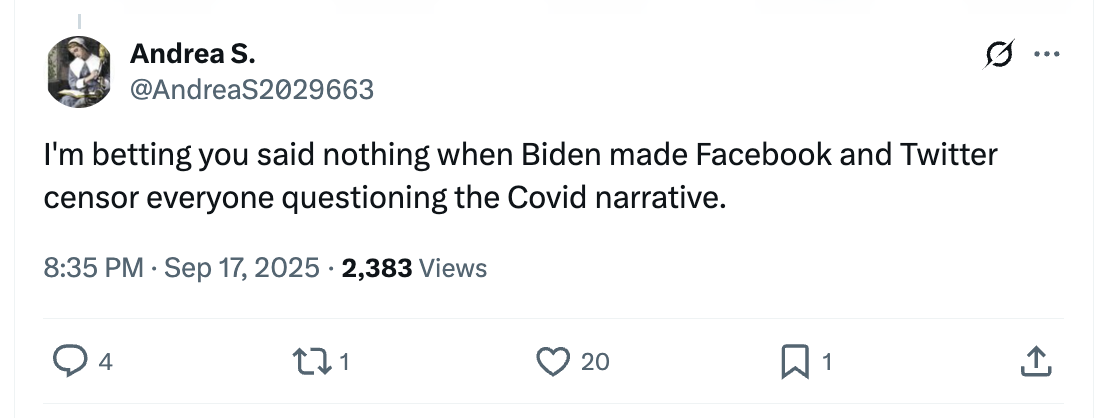
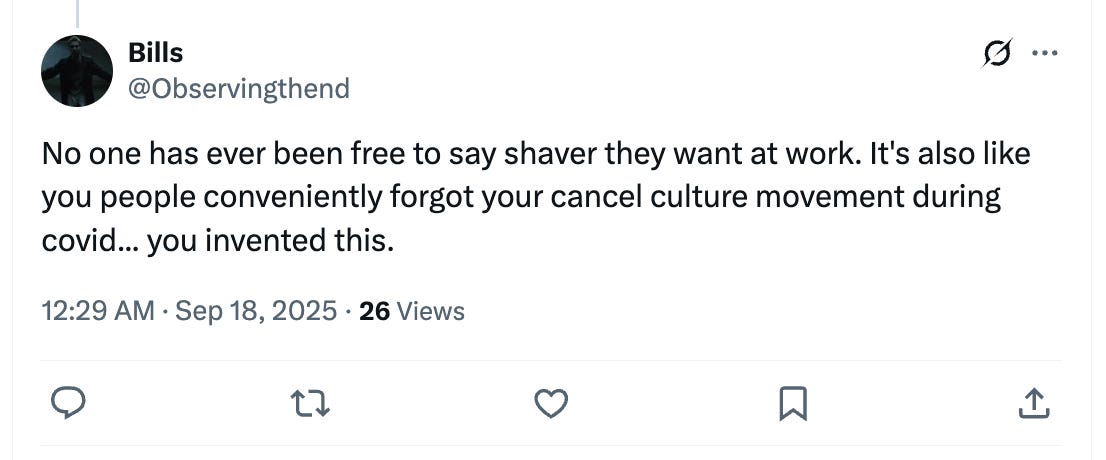
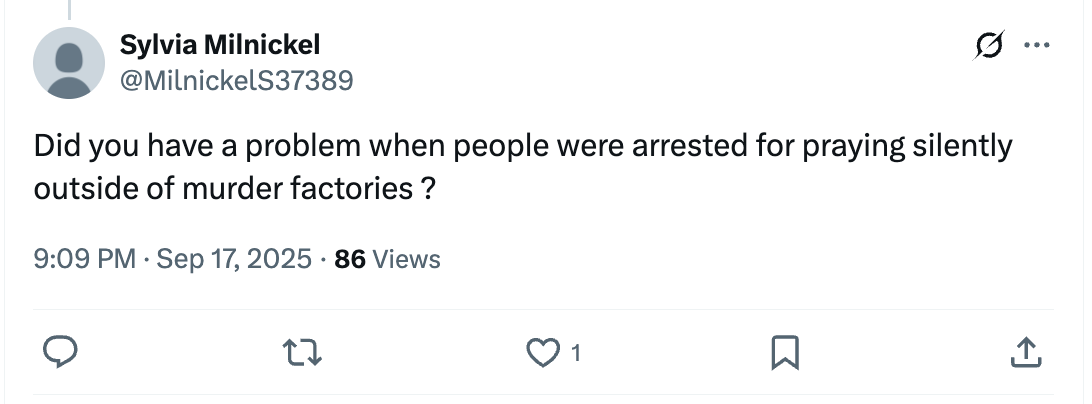
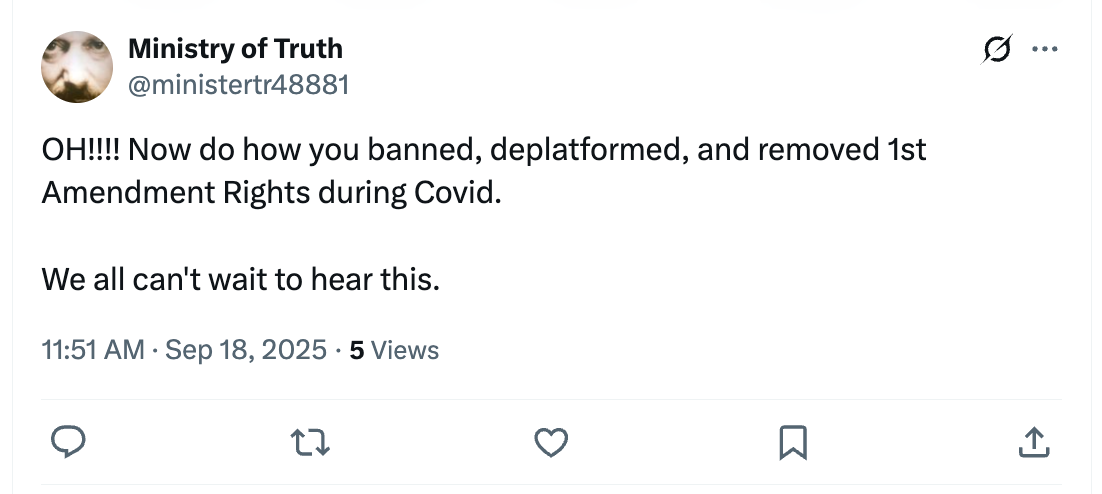
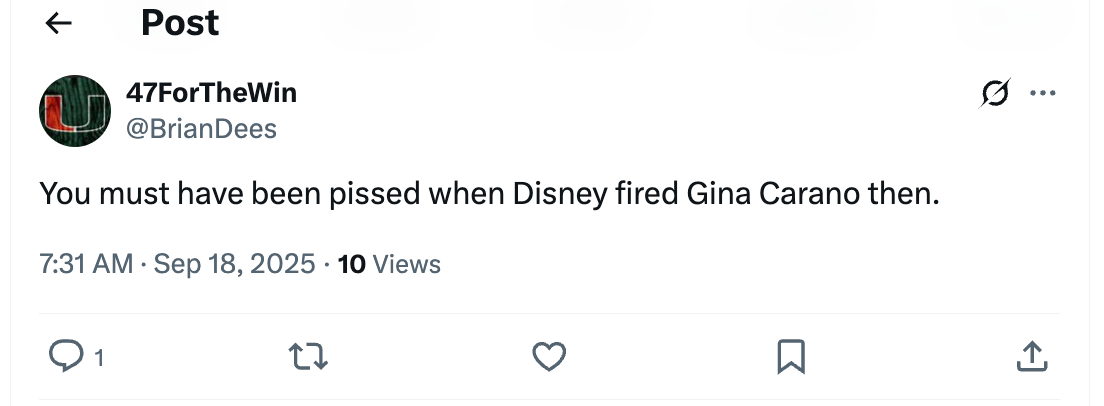

I agree FCC should not make threats as it did and that issue should be addressed on its own. I’m not so sure, as you state, Kimmel was fired for “having an opinion.” I wonder if Disney felt the services they were paying Kimmel for (comedy that entertains a wide audience) were not what he was delivering. Does Disney have a right to suspend an employee who is not doing the job to the employer’s satisfaction? If Disney said on Wednesday, “Hey Jimmy, you need to dial it down tonight on the show we are paying you to work on.” And he replied, “No! I’m going to go on the show that you are paying me to do and double down!” Does the company have a right to make a business decision to suspend? Does Kimmel still have his free speech to make comments on social media, YouTube, or other outlets? Can he start a new show or did he make the decision to sign a “non-compete” clause in his contract which he agreed in advance would prohibit him from doing another talk show for a period of time? In short, is FIRE sure it has all the facts in this dispute? I wonder if we will find out more that complicates the story.
granted the fcc chair carr's comments on a podcast (easy way or hard way) are not what free speech advocates want to hear.
however: "The decision to preempt ‘Jimmy Kimmel Live!’ was made unilaterally by the senior executive team at Nexstar, and they had no communication with the FCC or any government agency prior to making that decision," a Nexstar spokesman said.
so, if we take this spokesperson at his word, the trump admin, did exactly what to undermine free speech?
compared to biden's systematic threatening of social media + moving dem leaning personnel from the fbi/cia/national security agencies to the legal and 'safety' groups inside big tech to censor americans throughout covid - trump's fcc actions look like nothing more than bluster.
remember when the ny post was kicked off of twitter for the hunter biden laptop story + how the fbi/intel groups tried to pre-debunk the story w/ big tech despite having the laptop for 1+ yr prior and verifying the details? when trump was kicked off twitter for questioning election integrity after the first ever wide use of mail in ballots?
i think carr's and bondi's comments are abhorrent and ignorant of the principle of 1A, but the trump presidency has some catching up to do if it wants to contend w/ the 1a violations of the autopen / weekend at bernie/biden's presidency.